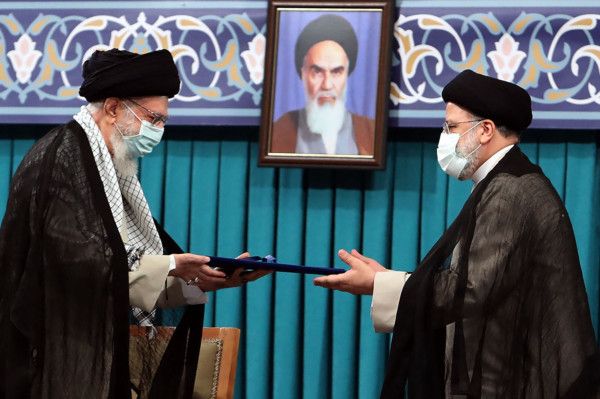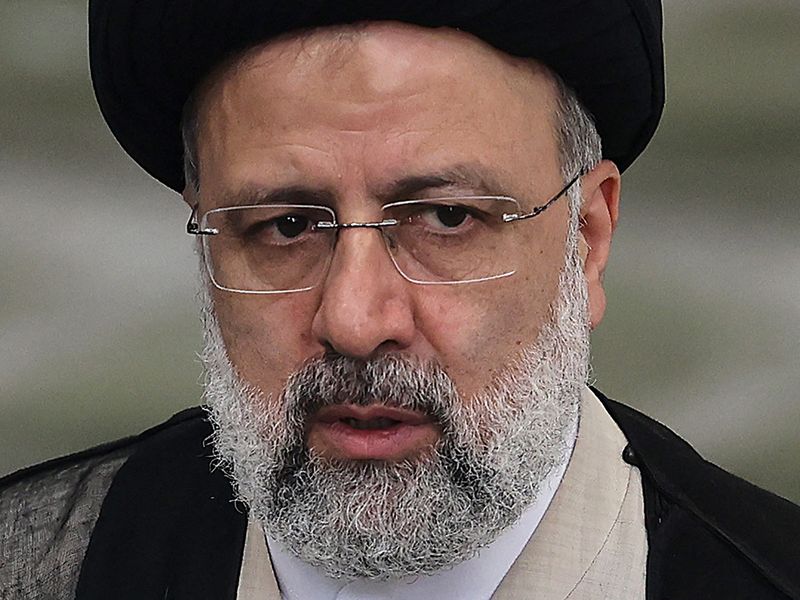
Tehran: An ultraconservative protege of Iran’s supreme leader was sworn in as president on Tuesday as a new security crisis swirls in vital Gulf shipping routes and doubts build over the survival of the troubled 2015 nuclear deal.
Ebrahim Raisi, 60, was confirmed by Ayatollah Ali Khamenei in a televised ceremony, ending the eight-year rule of Hassan Rouhani, a more moderate figure whose ambition to build ties with the West floundered. Raisi is expected to present his proposed cabinet on August 5.

* Aged just 20, in the wake of the 1979 Islamic revolution that toppled the US-backed monarchy, Raisi was named prosecutor-general of Karaj, which neighbours Tehran.
* For the exiled opposition and rights groups, his name is indelibly associated with the mass executions of Marxists and other leftists in 1988, when he was deputy prosecutor of the Revolutionary Court in Tehran.
Asked in 2018 and again last year about the executions, Raisi denied playing a role, even as he lauded an order he said was handed down by the Islamic republic’s founder Ayatollah Ruhollah Khomeini to proceed with the purge.
* In 2019, the US placed Raisi and others on a sanctions list citing the executions and other alleged rights abuses.
* Raisi has decades of judicial experience, serving as Tehran’s prosecutor-general from 1989 to 1994, deputy chief of the Judicial Authority for a decade from 2004, and then national prosecutor-general in 2014.
* He studied theology and Islamic jurisprudence under Khamenei and, according to his official biography, has been teaching at a Shiite seminary in Mashhad since 2018.
* In 2016, Khamenei put Raisi in charge of a charitable foundation that manages the Imam Reza shrine in Mashhad and controls a large industrial and property asset portfolio.
* Three years later, Khamenei appointed him head of the Judicial Authority. Raisi is also a member of the assembly of experts who select the supreme leader.
* He is married to Jamileh Alamolhoda, an educational sciences lecturer at Tehran’s Shahid-Beheshti University. They have two daughters.
* Raisi portrays himself as a pious figure and corruption-fighting champion of the poor.
* Raisi’s election triumph came after he lost to Rouhani in 2017. This time, only five ultraconservatives and two reformists were approved to run after many other prominent figures were disqualified.
* Raisi gathered support from traditional conservatives, who are close to the Shiite clergy and the influential merchant class, as well as ultraconservatives who are united in their anti-Western stance.
Flanked by Khamenei, senior clerics and Rouhani, Raisi said the people’s trust had been damaged by “foreign enemies and internal failures.” He made no direct reference to the nuclear deal.
“We will pursue the removal of the cruel sanctions, but we won’t make people’s livelihoods dependent on it,” he said in a speech.
The cleric will have to immediately deal with intensifying international pressure over a deadly attack last week on a vessel transiting the Gulf, which the US and others have blamed on Iran. He’ll also have to signal his intentions for stalled diplomatic efforts to save the landmark atomic accord, which unravelled after Donald Trump withdrew the US in 2018 and reimposed sanctions, including on critical energy exports.
While Raisi has said he intends to continue the negotiations in Vienna to save the agreement, his presidency marks the return of a hardline, staunchly anti-Western brand of politics to the executive branch of the Islamic Republic.
The composition of his foreign-policy team — and especially whether it contains officials with first-hand knowledge of the talks — could prove critical in determining progress. Oil markets were following events in the Austrian capital closely as a successful outcome would likely spur a surge in Iranian exports later in the year.
Yet instead of diplomatic agreement, mistrust is deepening following last Thursday’s drone attack on an Israel-linked vessel off the coast of Oman, which Iran denies carrying out. The US and Israel have vowed a response, while the UK summoned Iran’s envoy to London and dispatched officials to inspect the damaged vessel at anchor off the United Arab Emirates.
Israel — Iran’s leading regional foe - opposes lifting sanctions on Tehran imposed by the Trump administration, and the two nations have for months traded allegations of attacking the other’s ships. The deaths of a Briton and a Romanian on board the most recently targeted vessel raised the stakes.
The nuclear agreement imposed strict limits on Iran’s nuclear activity in exchange for sanctions relief. After the deal began to fray, Iran increasingly breached caps on uranium enrichment and has now purified the material to near the level required for a nuclear weapon.
Tehran says its atomic programme is only intended for peaceful purposes, but concerns in the West that it could acquire the ability to build a bomb spurred the 2015 deal.
Lawmakers will vote to approve or reject Raisi’s nominees for office next week.
It’s unclear whether he will retain some members of Rouhani’s nuclear negotiating team in the interest of continuity or bring in officials who worked under Mahmoud Ahmadinejad, the last religious hardliner to helm the government in Iran.
Raisi, who won office in an election marred by low turnout as Rouhani’s middle-class backers stayed home, will also inherit a crisis in the country’s oil-rich southwest. Khuzestan province has been rocked by protests over water shortages and an economy battered both by US sanctions and the worst outbreak of the coronavirus in the region.
The disease worsened its grip on Iran last week, as the fast-spreading delta variant drove a fifth, record-breaking wave, with new cases averaging above 31,000 a day.








